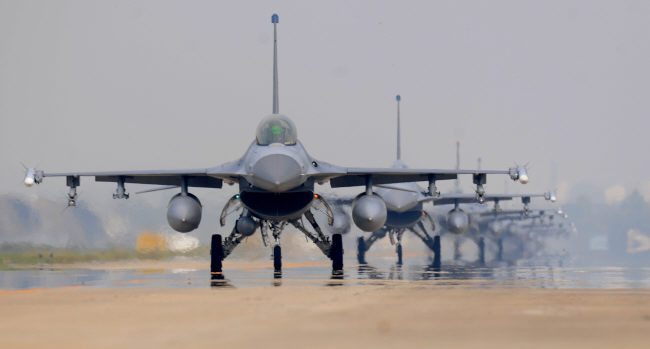SEOUL: North Korea has lowered its military alert status to a pre-crisis level, prompting similar moves by Seoul and US forces as tensions on the Korean peninsula showed signs of easing, a report said Friday.
Yonhap news agency quoted unidentified South Korean government sources as saying that the North recently lifted a special alert it issued on November 21 for its military forces on the coast near the disputed sea border.
“The North Korean military recently withdrew an order for special military readiness it had issued in connection with our Hoguk military drills,” a source was quoted as saying.
The South Korean military and US forces in South Korea had consequently reduced their own alert status by one notch to a normal level, the source said.
A defence ministry spokesman declined to comment on the report.
Cross-border tensions have been high since the North shelled South Korea’s frontline Yeonpyeong island on November 23, following angry protests at the South’s military training near the disputed sea border.
The North also raised security fears that month by disclosing a uranium enrichment plant to visiting US experts.
But after a difficult year on the Korean peninsula, 2011 started on a more peaceful note.
The North began the year calling for improved relations with Seoul, while South Korean President Lee Myung-Bak Monday also reached out, saying he was open to talks and offering closer economic ties.
Efforts to resume long-stalled nuclear disarmament talks with the North also gained momentum as Beijing urged dialogue and Pyongyang signalled it was willing to return to the negotiating table.
In an unusually cordial statement, carried by its KCNA agency, North Korea said Wednesday the communist nation “courteously proposes having wide-ranging dialogue and negotiations”.
Pyongyang is “ready to meet anyone anytime anywhere”, it said, calling for “unconditional and early opening of talks” among officials with “real power and responsibility”.
South Korean officials were dismissive of the comments.
“In light of the contents and form of the offer, it cannot be seen as a sincere, official proposal for dialogue,” Vice Unification Minister Um Jong-Sik said on KBS radio.
The North had regularly issued similar statements in the past as part of its long-standing strategy to drive a wedge between the South Korean government and its people, he said.
He said the North should show seriousness of purpose by acting on its obligations under a 2005 agreement on denuclearization and apologising for the November shelling and the sinking of a South Korean warship last year.
But Chosun Sinbo, a pro-Pyongyang newspaper published for Koreans living in Japan, said the North’s offer was serious.
“It is natural to see that the bold offer for dialogue and negotiations reflect the leader’s own decision,” said the paper, which faithfully echoes Pyongyang’s view.
“South Korean authorities must accept the seriousness in purpose contained in the overture… Now it’s time that the South had to come forward,” it added.










